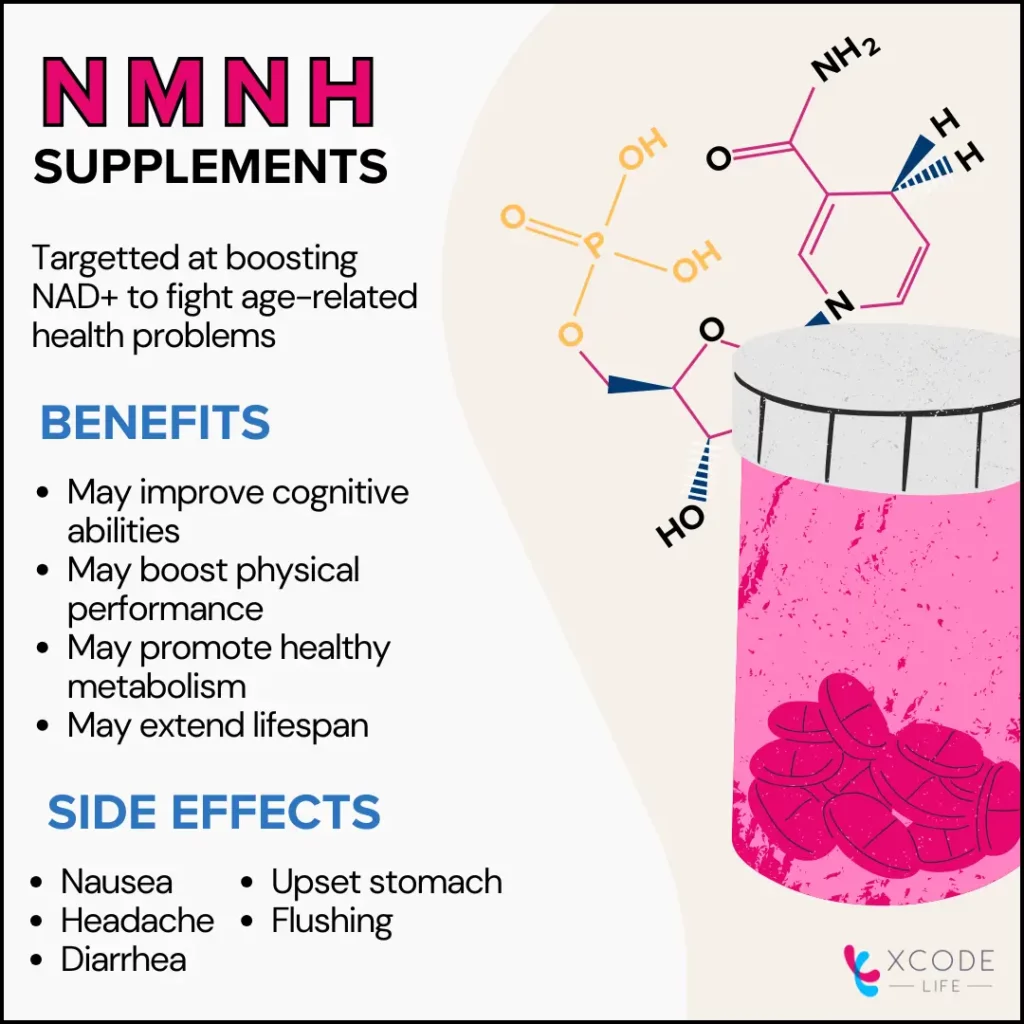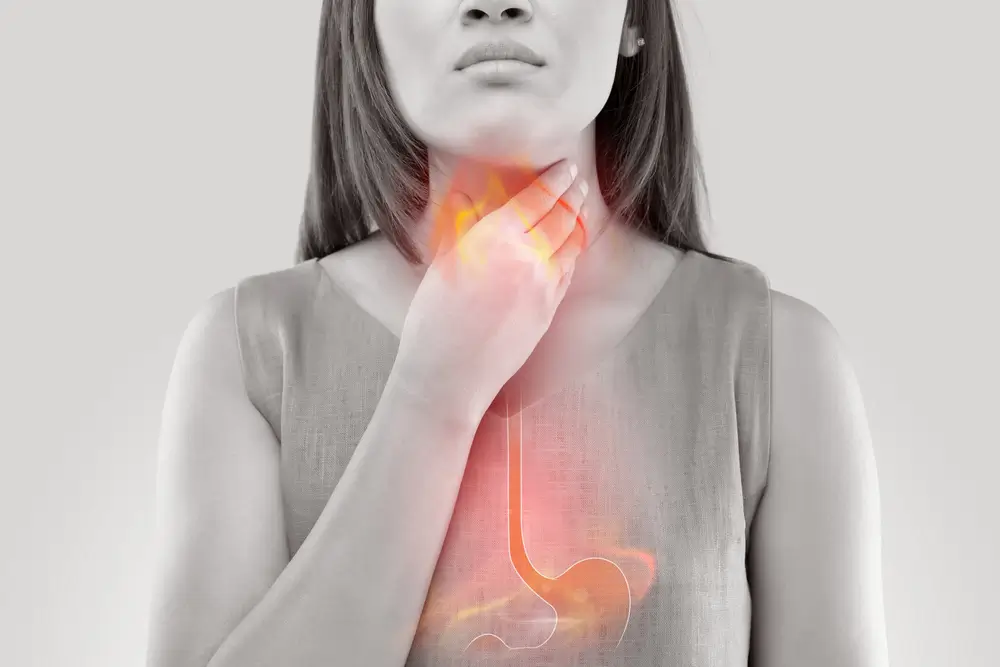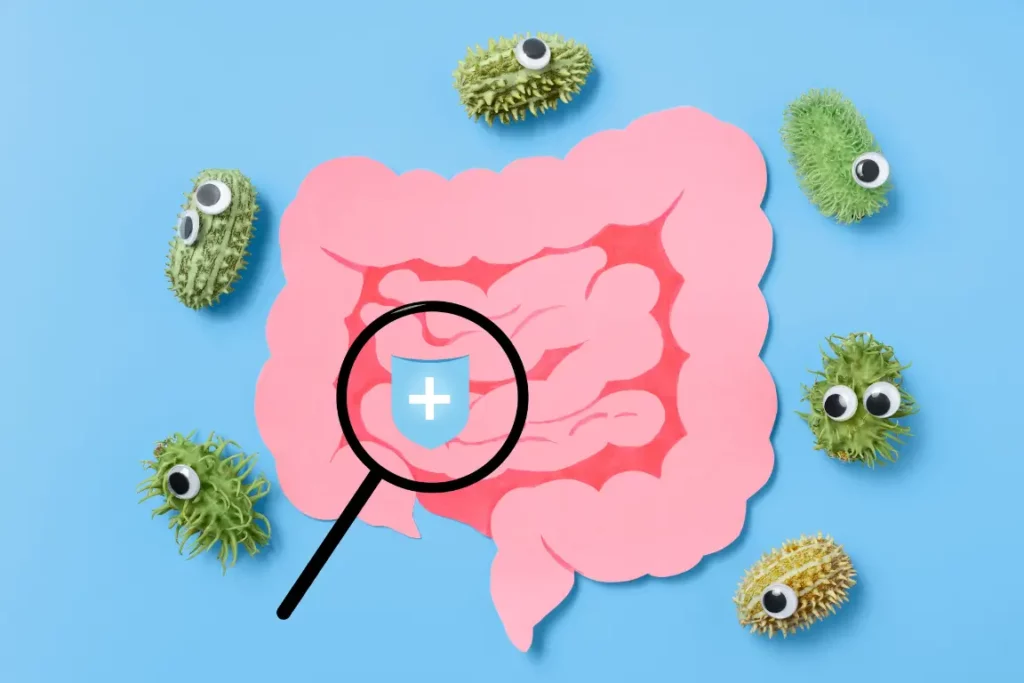NMNH (reduced nicotinamide mononucleotide) is a reduced form of the popular supplement nicotinamide mononucleotide (NMN). Both molecules boost the function of NAD+ (nicotinamide adenine dinucleotide), a coenzyme that helps energize you by regulating cellular processes. NAD+ levels decline with age, leading to age-related health issues. New research suggests that NMNH could boost NAD+ levels better than NMN can. If true, NMNH supplements could be a game changer to ward off age-related health infirmities. Here's what you need to know about them.
NMNH vs. NMN Supplements
NMNH and NMN are both supplements that help boost NAD+ levels, but there are notable differences in how they work:
| Feature | NMN | NMNH |
| NAD+ boost | Moderate increase | Nearly 10x higher increase |
| Response time | Slower | Rapid, within 15 minutes |
| Lasting impact | Short | Last up to 24 hours |
| Dosage efficiency | Higher doses needed | Minimal dose sufficient |
| Tissue impact | Limited to certain tissues | Works across multiple tissues |
| Health benefits | Basic support for aging and cells | Stronger support for cellular health and aging |
| Absorption | Standard | More efficient due to reduced form |
| Energy and metabolism | General support | Extended energy and metabolism boost |
| DNA repair | Moderate | Enhanced |
How Do NMNH Supplements Work?
Upon ingestion, NMNH is absorbed and converted into NAD+ through the action of nicotinamide mononucleotide adenylyltransferase (NMNAT).
As NAD+ naturally decreases with age, cellular function and efficiency can decline.
Increasing NAD+ levels with NMNH helps support crucial processes like energy metabolism, DNA repair, and cellular maintenance.
This increase in NAD+ can help mitigate age-related declines in cellular function, promoting healthier aging at the cellular level.
Health Benefits Of NMNH Supplements
NMNH is being studied for its ability to combat age-related decline, showing potential benefits at both cellular and systemic levels, such as:
- Improves cognitive abilities
- Boosts physical performance and stamina
- Promotes healthy metabolism, including better insulin sensitivity and fat processing
- Helps protect against neurodegenerative diseases like Parkinson’s and Alzheimer’s
- May extend lifespan, as suggested by preclinical research
Side Effects Of NMNH Supplements
While NMNH supplements are generally considered safe for most individuals, some may experience side effects, including:
- Nausea
- Headache
- Diarrhea
- Stomach upset
- Flushing
NMNH should also be used cautiously by individuals with certain medical conditions, such as:
- Liver disease
- Kidney disease
Note: Before starting NMNH, it's advisable to check with a healthcare provider, especially if you have any health conditions.
Who Should Take NMNH Supplements?
- Older adults looking to improve physical and mental health
- Athletes wanting to boost endurance and aerobic capacity
- People aiming to reduce aging effects like oxidative stress and DNA damage
- Those with low NAD+ levels facing fatigue or early aging signs
- People seeking to improve their metabolism and energy levels
Who Should Not Take NMNH Supplements?
- Individuals with liver or kidney conditions that may increase risks
- Pregnant or breastfeeding women, as safety studies are lacking
- People on medications like blood thinners or diabetes drugs due to potential interactions
- Those allergic or sensitive to NMNH or its ingredients

FAQs about NMNH Supplements
What Is The Difference Between NR And NMNH?
Nicotinamide riboside (NR) and NMNH are NAD+ precursors, yet they vary in chemical structure, metabolic pathways, and physiological effects.
- NR: A small molecule and a form of vitamin B3, it consists of a nicotinamide group linked to a ribose sugar.
Upon ingestion, the enzyme nicotinamide riboside kinase converts it into NMN, which then enters the NAD+ biosynthesis pathway.
- NMNH: The additional hydroxyl group on the ribose sugar found in NMNH improves its efficiency in boosting NAD+ levels.
It can be directly used in the NAD+ biosynthesis pathway without converting to NMN.
Which Is Better, NMN Or NMNH?
A 2021 study highlights that NMNH is more effective than NMN in boosting NAD+ levels.
Lab tests and studies on mice showed that NMNH increased NAD+ levels more efficiently in both cases.
Additionally, NMNH increased NADH, the reduced form of NAD+, which is essential for cell energy production.
It also impacted metabolism by slowing down key energy pathways, such as glucose breakdown and the citric acid cycle, to improve cellular health.
In lab experiments, NMNH caused cell cycle arrest and inhibited cell growth, while no significant change in mouse weight was observed.
While both NMN and NMNH enhance NAD+ levels, NMNH's effects may offer superior benefits for health and aging.
Why Did The FDA Ban NMN?
The FDA has banned NMN under the "drug exclusion clause" of the Federal Food, Drug, and Cosmetic Act (FD&C Act).
According to section 201(ff)(3)(B) of the Act, any substance classified as an approved drug or tested as a new drug cannot be marketed as a dietary supplement.
Since NMN underwent clinical investigations before being sold as a supplement, the FDA determined it didn't qualify as a dietary supplement and banned it in the U.S. market.
Summary
- NMNH is a more efficient supplement than NMN, requiring a smaller dosage to boost NAD+ levels.
- It supports anti-aging, energy production, DNA repair, and metabolism.
- NMNH also improves cognitive abilities and stamina and protects against neurodegenerative diseases.
- While generally safe, it should be avoided by pregnant women or those with liver or kidney conditions.
Others Are Also Reading

Should You Take DGL Supplements For Treating Acid Reflux?

Are Postbiotics Better Than Probiotics For Gut Health?
References
https://www.uthpeak.com/blog/what-is-nmnh-matter-for-your-health
https://www.uthpeak.com/nmnh-vs-nmn
https://downloads.regulations.gov/FDA-2023-S-0023-0084/attachment_1.pdf
https://www.healthline.com/health/nmn-nicotinamide-mononucleotide-benefits-side-effects-and-dosage
https://pmc.ncbi.nlm.nih.gov/articles/PMC6145238
https://pmc.ncbi.nlm.nih.gov/articles/PMC7384296





